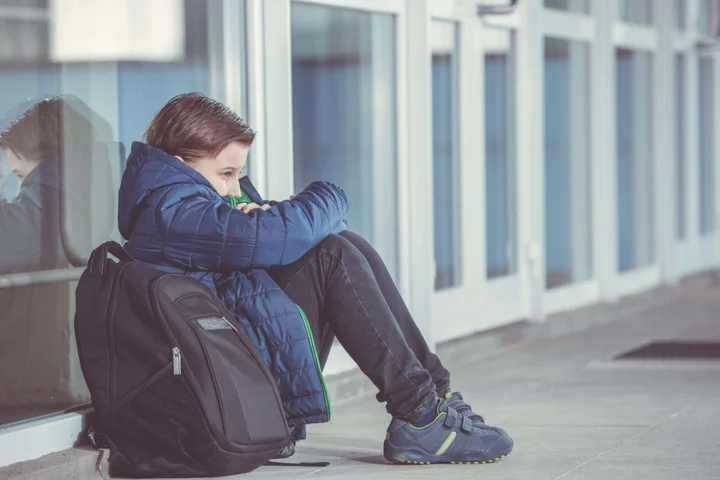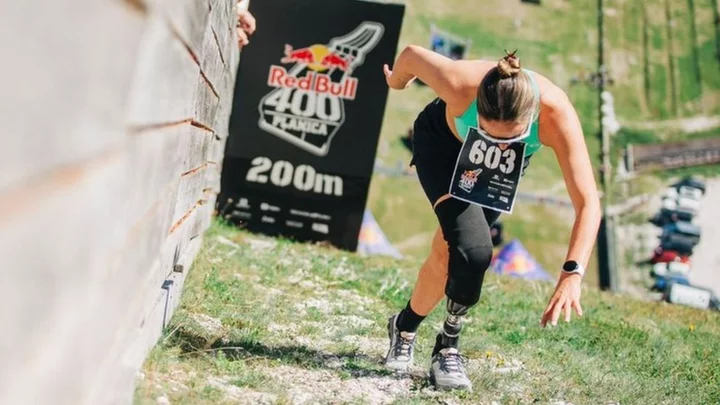
It’s not just dry skin: 5 things everyone needs to know about eczema
It’s easy to dismiss eczema as just itchy dry skin. But as millions of people know, the effects of eczema go way beyond this. “Eczema is so much more than ‘just an itch’,” says Andrew Proctor, chief executive of the National Eczema Society. “Affecting over eight million people in the UK, this incurable, highly visible skin condition has a huge impact on every aspect of a person’s life, extending far beyond the physical symptoms of itchy, inflamed, sore, cracked and bleeding skin. “Living with eczema means constantly having to plan and prepare, as every decision you make will potentially affect your skin. It shapes your home environment, education, career, social life, hobbies, holidays and relationships, and as a result, patients often report feeling anxious, depressed, self-conscious, isolated and helpless.” This National Eczema Week (September 9-16), here’s what Proctor wants everyone to know… 1. It doesn’t just affect children Atopic eczema affects one in five children and one in 10 adults in the UK. Proctor says: “While eczema is often viewed as a childhood condition, it affects people of all ages. Some develop eczema as babies, others in childhood, but thankfully it can improve over time.” Some people will have eczema all their life however, and some only develop it in their later years. “The important thing is to seek medical advice as soon as possible to get control of the eczema and develop an effective skincare routine,” advises Proctor. 2. It’s not contagious Proctor says that sadly, many people still think you can catch eczema. “However, atopic eczema isn’t contagious,” he stresses – pointing out it’s a complex condition involving genes, the immune system, the environment and our skin barrier. “This means skin becomes very dry and doesn’t provide sufficient protection from irritants, allergens and infection.” To tackle this, a foundation of eczema care is to apply medical moisturisers (emollients) to trap water in the skin and help reinforce the skin barrier. “Finding the emollient that suits your skin best can involve a lot of trial and error, but it’s critical to managing eczema,” says Proctor. 3. Environment plays a huge role Environmental factors can trigger eczema flare-ups or make it worse. Common culprits include stress, being too hot/cold or experiencing a sudden change in temperature, soap, shampoo and bubble bath, laundry detergent and cleaning products, perfume, pollens and moulds, pet fur, wool and synthetic fabric, and house dust mites. “Everyone will have certain things that trigger their eczema, and these vary between people,” Proctor explains. “Try keeping a diary to help identify triggers and patterns, so you can remove likely suspects and see if it helps. Triggers can also change over time and it’s worth continuing with the diary even if you think you’ve identified yours.” 4. It’s hard not to scratch Proctor explains: “One of the most maddening things you can say to someone with eczema is ‘stop scratching’. It’s not that simple! The unbearable, relentless itch is one of the defining features of the condition, and patients refer to it as torture. “You know you shouldn’t scratch, as it damages the skin and can cause infections, but the relief it provides is irresistible.” To help manage the itch, Proctor suggests finding a positive distraction or asking others to help you take your mind off it. You could also try substituting another action for scratching – press a nail on the itchy patch or tap the skin gently with your forefinger; keep your hands occupied with a ball, toy or other object; or wrap a bag of frozen peas in a towel and apply it to the itchiest area. 5. It’s a mental as well as physical battle Living with eczema is mentally exhausting too. “It can be a rollercoaster of emotions, from excitement when you start a new treatment, to despair when it doesn’t work or you experience a bad flare-up,” says Proctor. “There can be huge frustration too, when you do everything you’ve been asked and the eczema still refuses to give you any respite.” If this happens, as well as asking your GP or dermatologist for a review, it’s important to reach out to family and friends for support: “People who are able to open up about how their eczema truly affects them can feel a huge weight has been lifted.” Other ways to help cope include good nutrition and hydration, regular exercise, rest and relaxation. “Journaling, meditation and mindfulness can help you focus on the good things in your life and counterbalance negative feelings about eczema,” adds Proctor. “When so much time and effort goes into managing your eczema, it’s easy to forget there’s more to you than just your skin. Think about what you want to accomplish and formulate a plan. It’s about living successfully alongside eczema, not having your life defined by it.” For more information, visit eczema.org. The NES’ new video – More Than ‘Just An Itch’ – goes live on September 9 to mark National Eczema Week. Read More Charity boss speaks out over ‘traumatic’ encounter with royal aide Ukraine war’s heaviest fight rages in east - follow live YouTube begins verifying videos by UK doctors to tackle health misinformation Should you swap your foundation for a lightweight skin tint? What should you do if you think your child is being bullied at school?
2023-09-08 16:22

Police probe after human skull dropped at Arizona Goodwill
A human skull was found in a donation box at a Goodwill store in Arizona, prompting local authorities to open an investigation into the "unusual" contribution. The skull with a fake eye and several teeth still attached was discovered by an employee on Tuesday who informed the authorities as they feared it was related to a crime. Police said officers responded to the reports of skull discovery and took possession of what was believed to be “an actual human skull”. The box was dropped off at some point over the weekend, Goodyear Police spokesperson Lisa Berry said. It “did not ever make it to the floor. It was in the donation box, again, with other taxidermy items”, Ms Berry told ABC15. "This is an unusual one," she added. A Goodwill spokesperson said the employee “followed protocol” by calling the police immediately after discovering the skill. “Goodwill is cooperating with the appropriate authorities,” the spokesperson said in a statement. The box was placed into a store’s bin without a return address, according to authorities. The skeletal remains were sent to the Maricopa County medical examiner’s office where the officials found the skull to be of "historic origin" dismissing any possibility of foul play. "It appears to be historic, ancient and does not appear to have any forensic value at all,” said Ms Berry. “And what that means is that no crime is attached to this skull.” She praised the employees who alerted authorities, saying: "Goodwill did do the right thing. Anything suspicious should always be reported." Sydney Steele, a Goodwill shopper, KPHO-TV that they were shocked to hear about the news of the skull discovery. “I’ve never heard of anything donated like this, especially here,” she said. “I come to this Goodwill all the time and I’ve never heard of anything that crazy being donated.” Read More Woman in ‘living hell’ with brain slipping down her spine after ice-skating accident Confessions, a damning dog video and ‘family annihilator’: Key revelations from Alex Murdaugh’s trial An Indiana worker allegedly smashed his colleague’s head with a hammer. He then told a coworker ‘s*** happens’
2023-09-08 15:51

Gas Prices Jump as LNG Workers Begin Long-Awaited Strikes
Liquefied natural gas workers at key Chevron Corp. sites in Australia began partial strikes Friday after talks failed
2023-09-08 15:28

Huawei Debuts Even More Powerful Phone as Controversy Swirls
Huawei Technologies Co. added a new top-of-the-line model to its controversial Mate 60 smartphone family on Friday, putting
2023-09-08 15:21

Pinault to Buy Majority Stake in Talent Agent CAA
French billionaire Francois Pinault’s holding company Artémis agreed to buy a majority stake in the Hollywood talent giant
2023-09-08 15:15

What should you do if you think your child is being bullied at school?
As well as being exciting, the start of a new school year can be very scary for some kids – as the toxic dynamic between bullies and the children they target could resume. The prospect of a new year of bullying, or the first experience of being a target for school bullies, can blight the lives of pupils and become something that terrifies both them and their parents, who are often unaware of the persecution of their child. Indeed, new research by the anti-bullying charity The Diana Award for its #BacktoBullying campaign has revealed 65% of children are scared of going back to school, with a third saying the thought of returning to school makes them want to cry. And it’s not just the kids who are scared – the study found half of parents dread sending their children back to school due to bullying. “When the new school year starts it can be an exciting and sometimes unsettling time for children,” points out Martha Evans, director of the Anti-Bullying Alliance (ABA). “There will be new pupils, new class groupings and, for some, new schools. It can be a worrying time and we’re often told friendships and bullying are high on the list of worries. “Parents should be aware of the signs that their child might be on the receiving end of bullying behaviour, and know how to respond.” Evans says research suggests being bullied can have serious implications for a child’s life chances, with the effects often lasting into adulthood. That’s why anti-bullying training and programmes for schools, including Anti-Bullying Week (November 13-17), are so vital for schools to help tackle the problem. Evans says it’s useful for parents who are concerned about bullying to understand exactly what bullying is, as “it’s not just ‘falling out’ or ‘banter’”. The ABA defines bullying as: “The repetitive, intentional hurting of one person or group by another person or group, where the relationship involves an imbalance of power. Bullying can be physical, verbal or psychological. It can happen face-to-face or online.” What are the signs of bullying? Children might not want to talk about what’s going on, but Evans says warning signs of bullying may include… Coming home with torn clothes or missing belongings. “This could show your child is being picked on physically,” says Evans. Unexpectedly not wanting to go to school. Evans points out that while most bullying starts face-to-face at school, it often then goes online, too. Complaining of unexplained illnesses or headaches. “The stress of bullying can create physical symptoms, or the child may make up illnesses to avoid being bullied at school,” warns Evans. Becoming quiet and withdrawn. Evans says worrying about hurtful behaviour can cause deep anxiety, and children may look upset when they use their electronic devices. “Online bullying is particularly hurtful,” explains Evans, “as it follows a child even after they’ve left the school gates and can continue 24/7.” Children who are being bullied may want to leave for school much earlier than necessary or come home late, says Evans. “Avoiding other children arriving or leaving school is a sure sign something is wrong,” she points out. What should you do if your child is being bullied? Stay calm Evans says it’s important to keep your cool, even though you’re probably feeling angry and upset that your child is being targeted. “You should focus on gently speaking to your child and listening carefully,” she explains. “Your job is to reassure them that it can be sorted out.” Get the facts Talk calmly to your child and establish what’s happened and who did what, and when. Evans advises parents and children to keep a diary of when the bullying happens, and explains: “It will be useful to see the pattern of bullying over time and to share with the school, if and when you speak to them.” Tell them not to retaliate Evans says parents shouldn’t encourage their child to retaliate to bullying, especially through violence, as it can have negative and unpredictable results. “They may be hurt even further, or be seen by those in authority as the problem,” she warns, and suggests instead that parents tell them to walk away and get help. Be aware of mental stress Don’t underestimate the effect bullying can have on a child’s mental health and keep an eye out for warning signs. “Bullying can have a considerable impact on a child’s mental health,” warns Evans, “so if your child is showing signs of serious distress, such as depression, anxiety and self-harm, always see a GP.” Find out what your child wants Parents should ask their child what they want to happen next, advises Evans, and help them to identify their choices, the potential next steps to take, and the skills they have to help stop the bullying. Speak to the school Ask to see the school’s anti-bullying policy, so both you and your child know the process for getting things sorted out, advises Evans. Don’t let them blame themselves Sometimes children can think they’re to blame in some way for being bullied, but Evans stresses: “Make it clear that bullying is never acceptable and if a child or young person is being bullied then it’s others who are to blame, not them.” Read More Charity boss speaks out over ‘traumatic’ encounter with royal aide Ukraine war’s heaviest fight rages in east - follow live What women should do if they experience violence online Athlete who ran over 200km through the desert shares advice for running in a heatwave Women being invited to help shape the future of reproductive healthcare – from period pain to menopause
2023-09-08 14:49

Detroit Lions shock reigning Super Bowl champion Kansas City Chiefs as 2023 NFL season gets underway
The National Football League's 2023 regular season got underway with a shocking result as the Detroit Lions defeated the reigning Super Bowl champion Kansas City Chiefs 21-20 at the Chiefs' Arrowhead Stadium on Thursday night.
2023-09-08 12:54

Kim Jong Un reveals 'nuclear attack submarine'
North Korea has not yet demonstrated that the submarine is actually operational.
2023-09-08 10:50

Apple shares slide after China government iPhone ban reports
The technology giant's stock market valuation has fallen by almost $200bn in the last two days.
2023-09-08 10:49

OLD Chaos as climate protesters disrupt Coco Gauff semifinal at US Open, glueing feet to floor
Chaotic scenes unfolded as climate protesters interrupted Coco Gauff’s US Open semifinal against Karolina Muchova with at least one person glueing their feet to the floor in the Arthur Ashe Stadium stands. Gauff was ahead 6-4, 1-0 when play was halted for around 49 minutes as security tried to remove the protesters. The group was wearing shirts that read, “End Fossil Fuels” and at least one person glued their feet making their removal difficult, a spokesperson for the US Tennis Association told The Associated Press. At least two people were taken away by police officers, who were cheered by the New York crowd who had chanted “Kick them out” as the disruption went on. Gauff sat in her seat on the sideline and ate fruit before hitting some practice serves, while Muchova was seen by a trainer. Eventually, both players headed back towards the locker room with Gauff chatting to members of her team until the disruption was handled. The US Open becomes the latest sports event to be impacted by climate protesters railing against the use of fossil fuels. At Wimbledon in July, two matches were interrupted when activists got onto Court 18 and threw orange confetti on the grass. The All-England club announced that the protester, along with another wearing shirts reading “Just Stop Oil,” were arrested “on suspicion of aggravated trespass and criminal damage.” The Just Stop Oil group has also protested at cricket, football and rugby matches, as well as at the World Snooker Championship. Just Stop Oil describes itself as a “nonviolent civil resistance group demanding the UK Government stop licensing all new oil, gas and coal projects.” Gauff, a 19-year-old American, and Muchova, a 27-year-old from the Czech Republic, were both playing in the semifinals at Flushing Meadows for the first time. The other women’s semifinal, between Aryna Sabalenka of Belarus and Madison Keys of the United States, was set to begin after Gauff vs. Muchova finished. The Associated Press contributed to this report. Read More Chris Packham climate change protest: TV presenter leads scientists in Westminister demonstration Climate activists hailed by Fearnley-Whittingstall for ‘putting liberty at risk’ Climate activists target jets, yachts and golf in a string of global protests against luxury Sierra Nevada lakes change more in past 100 years than three millennia How the climate crisis played a role in fueling Hurricane Ida Against the odds: The fight to save sea turtles in Ras Baridi
2023-09-08 09:54

NBC cuts away from Lions star's supposed NSFW touchdown celebration faster than you can say FCC
Detroit Lions star Amon-Ra St. Brown scored the first touchdown of the 2023 NFL season, and NBC had to cut away from his celebration.
2023-09-08 09:48

Red Bull 400: Amputee Milly Pickles completes 'world's steepest race'
Milly Pickles, 26, competed in the Red Bull 400 race six years after her below-the-knee amputation.
2023-09-08 09:22
